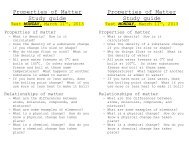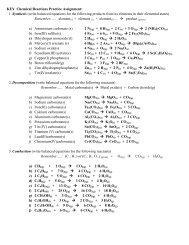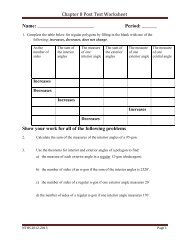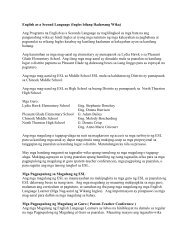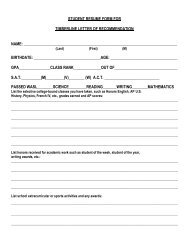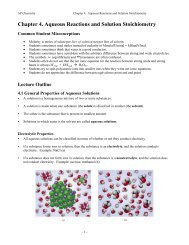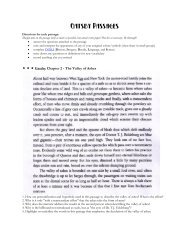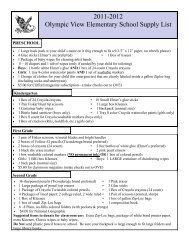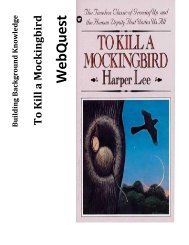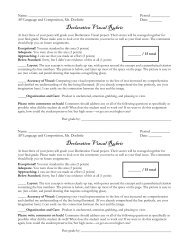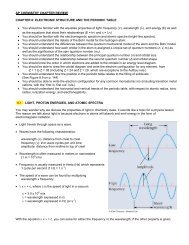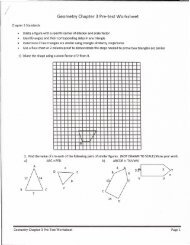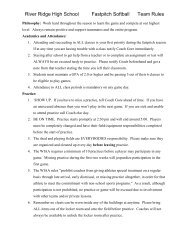Major Works Data Sheet
Major Works Data Sheet
Major Works Data Sheet
You also want an ePaper? Increase the reach of your titles
YUMPU automatically turns print PDFs into web optimized ePapers that Google loves.
12 th grade AP Literature Exam: Question 3<br />
The Great Gatsby<br />
Directions: As a senior taking the AP Literature exam, one of your essay prompts will be the infamous “open question.” This<br />
prompt (it’s always #3 on the test) presents you with a broad concept or theme; you must—from memory!—analyze how a<br />
quality work of literature typifies that concept or theme. Great Gatsby is applicable to all of the following prompts, which<br />
come from past AP exams. Be prepared to outline and/or write any of the following essays.<br />
* * * * *<br />
1982. In great literature, no scene of violence exists for its own sake. Choose a work of literary merit that confronts the reader or audience<br />
with a scene or scenes of violence. In a well-organized essay, explain how the scene or scenes contribute to the meaning of the complete<br />
work. Avoid plot summary.<br />
1983. From a novel or play of literary merit, select an important character who is a villain. Then, in a well-organized essay, analyze the<br />
nature of the character’s villainy and show how it enhances meaning in the work. Do not merely summarize the plot.<br />
1988. Choose a distinguished novel or play in which some of the most significant events are mental or psychological; for example,<br />
awakenings, discoveries, changes in consciousness. In a well-organized essay, describe how the author manages to give these internal<br />
events the sense of excitement, suspense, and climax usually associated with external action. Do not merely summarize the plot.<br />
1991. Many plays and novels use contrasting places (for example, two countries, two cities or towns, two houses, or the land and the sea) to<br />
represent opposed forces or ideas that are central to the meaning of the work. Choose a novel or play that contrasts two such places. Write<br />
an essay explaining how the places differ, what each place represents, and how their contrast contributes to the meaning of the work.<br />
1992. In a novel or play, a confidant (male) or a confidante (female) is a character, often a friend or relative of the hero or heroine, whose<br />
role is to be present when the hero or heroine needs a sympathetic listener to confide in. Frequently the result is, as Henry James remarked,<br />
that the confidant or confidante can be as much “the reader’s friend as the protagonist’s.” However, the author sometimes uses this<br />
character for other purposes as well. Choose a confidant or confidante from a novel or play of recognized literary merit and write an essay<br />
in which you discuss the various ways this character functions in the work.<br />
1997. Novels and plays often include scenes of weddings, funerals, parties, and other social occasions. Such scenes may reveal the values<br />
of the characters and the society in which they live. Select a novel or play that includes such a scene and, in a focused essay, discuss the<br />
contribution the scene makes to the meaning of the work as a whole.<br />
2002. Morally ambiguous characters—characters whose behavior discourages readers from identifying them as purely evil or purely<br />
good—are at the heart of many works of literature. Choose a novel or play in which a morally ambiguous character plays a pivotal role.<br />
Then write an essay in which you explain how the character can be viewed as morally ambiguous and why his or her moral ambiguity is<br />
significant to the work as a whole. Avoid mere plot summary.<br />
2004. Critic Roland Barthes has said, “Literature is the question minus the answer.” Choose a novel, or play, and, considering Barthes’<br />
observation, write an essay in which you analyze a central question the work raises and the extent to which it offers answers. Explain how<br />
the author’s treatment of this question affects your understanding of the work as a whole.<br />
2007. In many works of literature, past events can affect, positively or negatively, the present activities, attitudes, or values of a character.<br />
Choose a work in which a character must contend with some aspect of the past, either personal or societal. Then write an essay in which<br />
you show how the character’s relationship to the past contributes to the meaning of the work as a whole.<br />
6



